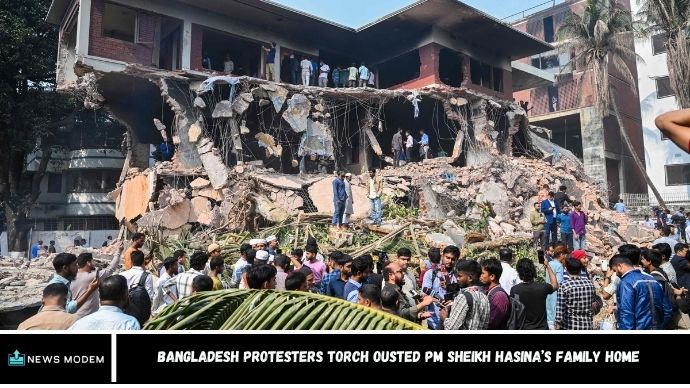Bangladesh Protesters Torch Ousted PM Sheikh Hasina’s Family Home Thousands of protesters in Bangladesh stormed and set fire to the historic home of the country’s founding leader, Sheikh Mujibur Rahman, while his daughter, ousted former Prime Minister Sheikh Hasina, delivered a passionate social media address urging her supporters to resist the interim government.
The attack on the house in Dhaka, which took place on Wednesday night, was triggered by a speech Hasina planned to deliver to her supporters from exile in India, where she fled last August following a violent student-led uprising against her 15-year rule. Critics accused her government of suppressing dissent.
The house, once the residence of Hasina’s late father, who led Bangladesh’s fight for independence from Pakistan in 1971, was also the site of his assassination in 1975. Hasina later transformed the home into a museum. Reports indicate that thousands of protesters, armed with sticks, hammers, and other tools, gathered around the house and the nearby independence monument, with some using a crane and excavator to demolish the building.
The Background of Political Unrest in Bangladesh
Bangladesh has faced political turmoil for years, marked by violent protests and fierce rivalries between major political parties. The country has been under the leadership of Sheikh Hasina, the current prime minister, for much of the last decade. However, her tenure has not been without controversy.
Political Rivalries:
The two primary political forces in Bangladesh—the Awami League, led by Sheikh Hasina, and the Bangladesh Nationalist Party (BNP)—have long been at odds, with both sides accusing each other of corruption, authoritarianism, and misuse of power. Tensions escalated after the BNP’s leader, Khaleda Zia, was jailed and the party became marginalized.
Protests and Civil Unrest:
In recent months, opposition groups, disillusioned with Hasina’s leadership, have staged mass protests calling for her removal. These protests have sometimes turned violent, with protesters clashing with police and government forces.
The Incident: Protesters Set Fire to Sheikh Hasina’s Family Home
The attack on Sheikh Hasina’s family residence, located in the city of Tungipara, was a dramatic escalation of the unrest. Protesters, reportedly supporters of Khaleda Zia and the BNP, stormed the premises and torched parts of the house, sending a clear message of anger and defiance.
Key Events of the Attack:
- Date and Location: The incident occurred during a major protest rally organized by the BNP. The house, a symbol of Hasina’s political legacy, was attacked in a bid to undermine her influence.
- Scope of the Attack: While the damage to the house was significant, no fatalities were reported. The destruction represents a symbolic blow to the ruling regime.
- Rising Political Tensions: The torching of Hasina’s home is not an isolated incident but part of a larger pattern of escalating violence linked to the broader struggle for political power in Bangladesh.
Why Are Bangladesh Protesters Targeting Hasina’s Family Home?
The act of setting fire to the family home of a former prime minister is a deeply symbolic one. For many, it reflects a growing sentiment of frustration with Hasina’s prolonged rule.
- Ongoing Dictatorship Allegations: Critics of Sheikh Hasina have long accused her of running a dictatorship, using the country’s political and judicial systems to silence opposition leaders.
- Political Symbolism: The family home of a former leader is a powerful political symbol. By targeting it, protesters aimed to make a statement about the corruption and perceived authoritarianism of Hasina’s leadership.
- Public Sentiment: Recent opinion polls show a growing dissatisfaction among the population with Hasina’s governance, especially on issues of economic inequality and freedom of speech.
What Does This Mean for Bangladesh’s Future?
The burning of Sheikh Hasina’s family home is more than just an isolated protest—it’s a sign of deeper political divides and the potential for continued unrest.
Political Instability:
- The act is likely to increase political instability, with the government responding by cracking down harder on protests and opposition groups.
- International Reactions: The international community may view this escalation with concern, especially regarding human rights and democratic processes in Bangladesh.
Potential for Change:
- The protests, though violent, may reflect a desire for greater political reform. If opposition parties gain traction, this could lead to a shift in Bangladesh’s political landscape.
- However, with Hasina’s grip on power remaining firm for now, the future of political change seems uncertain.
FAQs:
1. Why did Bangladesh protesters target Sheikh Hasina’s family home?
Protesters aimed to send a symbolic message against Hasina’s rule, expressing anger over her leadership and perceived authoritarianism.
2. What is the political situation in Bangladesh?
Bangladesh is currently experiencing political unrest due to longstanding rivalries between the Awami League and the BNP, with Hasina’s government facing criticism for corruption and authoritarian practices.
3. What happened during the attack on the family home?
Protesters set fire to parts of Sheikh Hasina’s family residence, escalating tensions between the opposition and the ruling party.
4. How has Sheikh Hasina responded to the unrest?
Hasina’s government has been cracking down on protests, using security forces to suppress opposition rallies and maintain control.
5. Are these protests common in Bangladesh?
Yes, political protests have been frequent in Bangladesh, often escalating into violent clashes between opposition groups and government forces.
6. What does this mean for Bangladesh’s political future?
The incident signals potential for continued unrest, but it also highlights dissatisfaction with the current government, possibly paving the way for political change.
Conclusion
The recent attack on Sheikh Hasina’s family home by protesters is a stark reminder of the deep political divisions in Bangladesh. As unrest continues to grow, the country faces an uncertain future, with tensions likely to rise in the coming months. Whether this will lead to meaningful political change or further violence remains to be seen, but one thing is clear: Bangladesh is on the brink of a new chapter in its political history.








